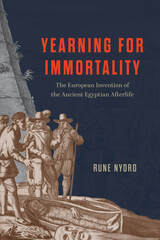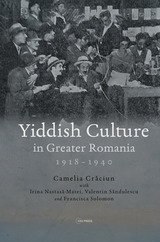9 start with V start with V
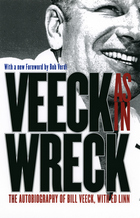
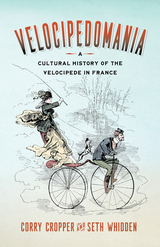
Velocipedomania is the first in-depth study of the velocipede fad and the popular culture it inspired. It explores how the device was hailed as a symbol of France’s cutting-edge technological advancements, yet also marketed as an invention with a noble pedigree, born from the nation’s cultural and literary heritage. Giving readers a window into the material culture and enthusiasms of Second Empire France, it provides the first English translations of 1869’s Manual of the Velocipede, 1868’s Note on Monsieur Michaux’s Velocipede, and the 1869 operetta Dagobert and his Velocipede. It also reprints scores of rare images from newspapers and advertisements, analyzing how these magnificent machines captured the era’s visual imagination. By looking at how it influenced French attitudes towards politics, national identity, technology, fashion, fitness, and gender roles, this book shows how the short-lived craze of velocipedomania had a big impact.

Part of a look-alike generation of all-purpose stadiums erected around the country, the Vet took on its own personality over the years. For all its deficiencies, it left fans loving it in the way they loved their own families—warts and all. Almost 100 photographs and Rich Westcott's yarns make Veterans Stadium the one book that will help Philadelphians—and Philadelphia visitors—remember thirty years of their history.
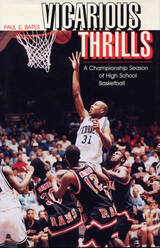
This engaging book chronicles the Carbondale Terriers’ 1993–94 season, a season in which the team progressed all the way to the state high school basketball championship game before ending the season with a one-point loss.
Although arranged chronologically, the book is much more than a team diary. Paul E. Bates, whose son was one of the team’s starting guards, brings his sensitivity and expertise as an educational psychologist to bear on team sports in general and on how they define and are defined by the players and coaches that make up the teams and by the communities in which they thrive.
Bates frames the team’s experience by sharing his own personal love of basketball, beginning with his childhood years in Decatur, Illinois, when Stephen Decatur High School was a perennial Illinois high school powerhouse. Through his exploration of the sport and his involvement and interest in it, Bates creates a book that serves both as a rousing tale of youthful achievement and as a history of high school basketball in the state of Illinois.
Throughout his account, Bates repeatedly emphasizes his belief that extraordinary accomplishment is no accident but rather the result of years of preparation, dedication, and hard work. Most of the key performers on the 1993–94 Terriers, for example, had played together on a grade school all-star team that was undefeated. Then, in junior high, this group went on to win numerous championships, and in high school their remarkable success continued, even though their accomplishments were humbled by season-ending losses.
But Vicarious Thrills leads the reader through a very personal account of both the ups and downs of championship basketball. Triumph does not occur without defeat, and it is through defeat that the team members, as well as their families and other supporters, learn many important lessons. As significant as the individual and team accomplishments are in making up this story, the 1993–94 basketball season is more importantly a beginning rather than the defining moment in the lives of these young men.
As an inspiration and motivation to young people, and as a spark to memories of childhood aspirations for older readers, this book is a pleasure to read for individuals of all ages.
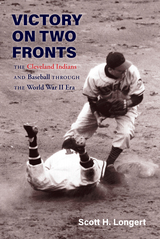
Beginning with the Cleveland Indians’ hard luck during World War II, this thrilling history follows the team through its historic role in racial integration and its legendary postwar comeback. Rich with player photographs and stories, this book is sure to excite American history buffs and baseball fans alike.
In early 1942, baseball team owners across the country scrambled to assemble makeshift rosters from the remaining ballplayers who had not left the sport for the armed forces. The Cleveland Indians suffered a tremendous loss when star pitcher Bob Feller became the first Major Leaguer to enlist, taking his twenty-plus wins per year with him. To make matters worse, the Indians’ new player-manager, Lou Boudreau, had no coaching or managing experience. The resulting team was mediocre, and players struggled to keep up morale.
Feller’s return in late 1945 sparked a spectacular comeback. A year later Bill Veeck bought the franchise and, over the next two years, signed the first American League players to break the color barrier: Larry Doby and Satchel Paige. The 1948 season ended with the Indians and Boston Red Sox tied, resulting in the American League’s first playoff game. Thanks in part to rookie Gene Bearden’s outstanding pitching, the Indians went on to beat the National League’s Boston Braves for their second World Series title.
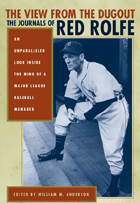
-Bill James, in The New Bill James Historical Baseball Abstract, on the journals of Red Rolfe
"Red Rolfe's journal for his years as manager of the Detroit Tigers is the kind of precious source researchers yearn for. In combination with William M. Anderson's well-done text, The View from the Dugout will be of great interest to general readers and of immense value to students of baseball history."
-Charles C. Alexander, author of Breaking the Slump: Baseball in the Depression Era
"Red Rolfe was one of baseball's most astute observers. This is 'inside' baseball from the inside."
-Donald Honig, author of Baseball America, Baseball When the Grass Was Real, and other books in the Donald Honig Best Players of All Time series
"In his lucid journals Red Rolfe has provided an inside look at how an intelligent baseball manager thinks and prepares."
-Ray Robinson, Yankee historian and author of Iron Horse: Lou Gehrig in His Time
Baseball players as a rule aren't known for documenting their experiences on the diamond. Red Rolfe, however, during his time as manager of the Detroit Tigers from 1949 to 1952, recorded daily accounts of each game, including candid observations about his team's performance. He used these observations to coach his players and to gain an advantage by recording strengths, weaknesses, and tendencies of opposing players and managers. Rolfe's journals carry added value considering his own career as an All-Star Yankee third baseman on numerous world champion teams, where he was a teammate of Lou Gehrig and Joe DiMaggio.
Today, in the era of televised broadcasts, networks often wire a manager so that viewers can listen to his spontaneous comments throughout the game. Red Rolfe's journals offer an opportunity to find out what a manager is thinking when no one is around to hear.
William M. Anderson is Director of the Department of History, Arts and Libraries for the State of Michigan. His books include The Detroit Tigers: A Pictorial Celebration of the Greatest Players and Moments in Tigers' History.
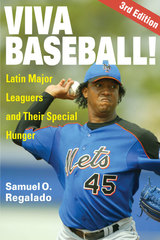
Lively and filled with vivid anecdotes, Viva Baseball! chronicles the struggles of Latin American professional baseball players in the United States from the late 1800s to the present.
As Latino players, managers, and owners continue to blossom into baseball's biggest stars, they have benefited from a growing Spanish-language media, a group identity, an increase in financial leverage and attention, and a burgeoning Latino culture in the United States. Although there have been several positive developments in the treatment of Latin American players, many, such as Albert Pujols, Pedro Martinez, Alex Rodriguez, and Ozzie Guillen, still face shocking racism. Samuel O. Regalado draws upon archives and rich interviews with Latin baseball stars like Felipe Alou, Orlando Cepeda, and Minnie Minoso to show the changing tenor of discrimination in the twenty-first-century game.


On a June morning in 1990, high up in the Canadian Rockies, Robin Cody pushed his sixteen-foot Kevlar canoe through tall grass and mud to launch it on peaceful Columbia Lake, the nominal source of the river that heaves more water into the Pacific ocean than any other in North or South America. For the next eighty-two days, Cody would portage massive dams and revel in the rapids as the great river plunges 2,700 feet in 1,200 miles before reaching the river’s mouth in Astoria.
Cody’s canoe sneaks up on the bear and moose and raptors and beavers who make a living on the Columbia. He drops in on riverpeople: the trapper, the wind surfer, the archeologist, the lock operator, the native woman who grew up at riverside in a dwelling of tule reeds. With a generous and infectious spirit, Cody draws us into the mysteries of a much-altered and regulated river that is still, at heart, a life-giving place.
This first OSU Press edition of Voyage of a Summer Sun—winner of the Pacific Northwest Booksellers Association Book Award and the Oregon Book Award, and an Oregon State Library choice for “150 Books for the Oregon Sesquicentennial”—includes a new afterword by the author.
READERS
Browse our collection.
PUBLISHERS
See BiblioVault's publisher services.
STUDENT SERVICES
Files for college accessibility offices.
UChicago Accessibility Resources
home | accessibility | search | about | contact us
BiblioVault ® 2001 - 2025
The University of Chicago Press


